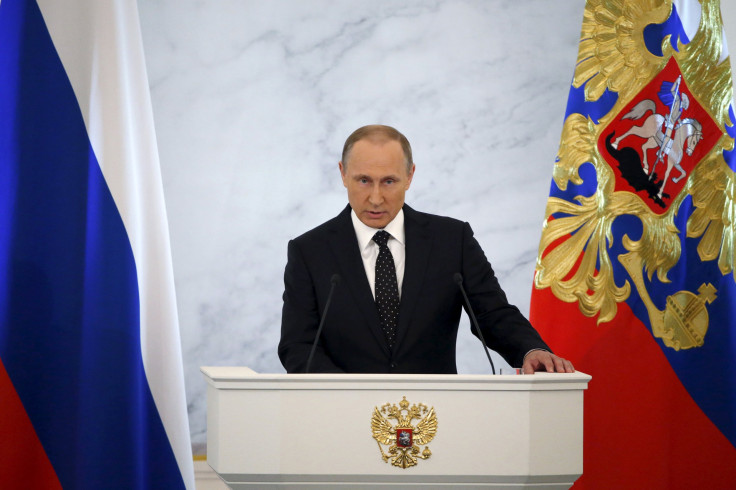Putin State Of The Nation Address: Russian President Focuses On Turkey, Terrorism In Hour-Long Speech

Addressing the Russian parliament Thursday, President Vladimir Putin launched another scathing attack on Turkey, warning that Turkish leaders “will regret” shooting down the Russian Su-24 bomber in Syria. The incident, which took place late last month, triggered a vehement war of words between the two nations followed by Russian trade sanctions.
“If anyone thinks Russia's reaction will be limited to trade sanctions, they are deeply mistaken,” Putin said, as he opened his annual state of the nation address. “We'll remind them again what they did -- they will regret it.”
Turkey, which insists that it shot down the Su-24 because the jet had trespassed into its airspace, has, so far, refused to give in to Russia’s demands to apologize for the incident. However, Putin rejected Turkey’s defense in his speech, saying: “Probably Allah alone knows why they did it.
“And apparently Allah decided to punish the ruling clique in Turkey by taking away their sanity,” he said, accusing them of “hypocritically trying to justify themselves and trying to cover up the crimes of terrorists.”
Putin said yet again that the Turkish government is not only letting militants of the Islamic State group sell oil -- an allegation Turkey denies strongly -- it is also directly benefiting from the oil trade.
During his hour-long address, the Russian president also reiterated the need for an international collaboration to combat terrorism, likening the fight against ISIS -- which, among other things, claimed responsibility for a recent bomb blast that blew up a Russian airliner over Egypt on Oct. 31, killing 224 people -- to the struggle against Nazism.
“In the 20th century, when people were not willing to join forces to fight Nazism they had to pay for that with tens of millions of innocent lives,” Putin said. “Today we face this barbaric ideology, and we should set aside our differences and unite in one anti-terrorist front under international law and the United Nations.”
Russia’s air campaign in Syria began in September. While the Russian government claims to be targeting only ISIS strongholds, the U.S. and its allies have expressed concerns that Moscow might also be bombing areas held by Syrian rebels opposed to President Bashar Assad, a staunch Russian ally.
“Terrorists in Syria pose a special threat [to Russia]. They receive money and weapons, build up their forces, and if they win there sooner or later they will come back to Russia and we will have to fight them here,” Putin said, in his address. “Our forces fight in Syria for Russia -- for the security of our people, first and foremost.”
The Russian president also touched upon the state of Russia’s floundering economy in his speech, reiterating the need to boost competitive production, increase help for small and medium-sized enterprises, and ensuring that the budget deficit for 2016 does not exceed 3 percent of the GDP.
Low oil prices and crippling economic sanctions -- which have resulted in large capital outflows -- have hurt the ruble and stoked inflation in Russia. The Russian central bank has tried to combat this with high interest rates -- despite opposition from Putin, who would prefer to see lower rates to encourage spending.
Russia's economic situation was “difficult but not critical,” Putin said Thursday, adding that by 2020, he wanted all of Russia's food to be made by domestic producers.
© Copyright IBTimes 2024. All rights reserved.












